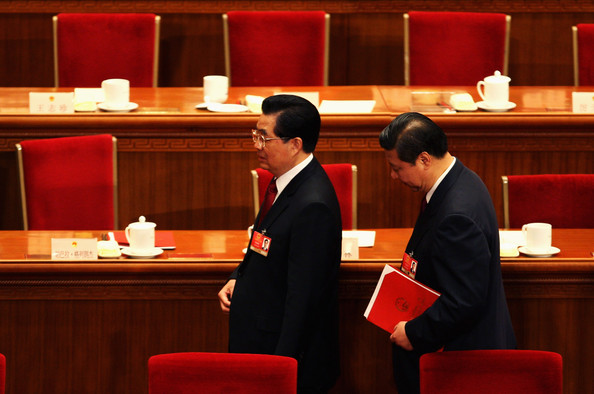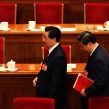
CCP 17th Central Committee Plenum Skips Xi Jinping and Inner-Party Democracy
Publication: China Brief Volume: 9 Issue: 19

The biggest piece of news to have come out of the Fourth Plenary Session of the Chinese Communist Party’s (CCP) 17th Central Committee is what that did not happen: the induction of Vice-President Xi Jinping into the policy-setting Central Military Commission (CMC). This is despite widespread reports by several domestic and foreign media that Xi, who is also a Politburo Standing Committee (SPC) member and President of the Central Party School, would be made a CMC vice-chairman in order to buttress his position as heir apparent to President and CMC Chairman Hu Jintao (The Associated Press, September 16; Ming Pao [Hong Kong], September 19; Straits Times [Singapore], September 11). More importantly, however, the Xi episode has thrown into sharp relief a major concern of the Central Committee plenum: the expansion of “intra-party democracy” and reform of the cadre system so as to raise the “governance ability” of party-and-government officials.
Speculation of Xi’s imminent accession to the military commission was taken seriously partly because then Vice-President Hu was made a CMC vice-chairman in 1999, exactly three years before he succeeded Jiang Zemin as party chief at the 16th CCP Congress in 2002. According to decisions made at the 17th Party Congress two years ago, Xi, who is the highest-ranked PSC member among Fifth-Generation cadres, is slated to replace Hu as CCP general secretary at the 18th Party Congress in 2012—and state president a few months later. Xi’s apparent failure to make it to the CMC this year, however, does not seem to have affected his “crown prince” status. According to the plenum communiqué released last Friday, only Hu and Xi made major speeches at the four-day conclave. Hu read out much of the “Resolution on certain major questions about strengthening and improving party construction under the new situation” (hereafter Resolution). Immediately afterwards, Xi gave a detailed explanation regarding how this Resolution was drafted. In time-honored CCP tradition, this was revealing symbolism signifying Xi’s formidable clout (Xinhua News Agency, September 18; Bloomberg, September 19).
The murkiness surrounding high-level personnel movements in the party, however, seems to run counter to the plenum theme of expanding democracy within the party. According to the Resolution, the CCP leadership pledged to “safeguard the democratic rights of party members.” “We will fully develop the enthusiasm, initiative and creativity of various levels of party organizations and the broad masses of party members,” the document indicated. Doubts, however, are being raised as to whether the Hu-led Politburo and Central Committee was merely repackaging Lenin’s well-known principle of “democratic centralism.” While noting that “intra-party democracy is the life of the party,” the Resolution stressed that “concentration and unity [of authority] is the guarantee of the forcefulness of the party.” It is significant that while “intra-party democracy” was featured even more prominently in Hu’s “Political Report to the 17th CCP Congress” of October 2007, little in the way of substance has been implemented in the past two years. For example, both the Political Report and the Resolution cited the possibility of boosting the powers of the full party congress, as well as allowing party members a bigger say in choosing senior cadres. Yet, such suggestions have only been taken up, if at all, at the level of counties (Wen Wei Po [Hong Kong], September 15; Xinhua News Agency, September 18).
Nothing illustrates the dearth of inner-party democracy better than the fact that the majority of the Central Committee’s 204 full and 167 alternate members do not seem privy to policies related to top-level personnel. Neither Hu nor other members of the PSC—the nation’s supreme governing council—felt obligated to explain to the plenum why the issue of Xi’s elevation to the CMC was not put on the agenda. Given that Hu himself got into the CMC in 1999—three years before the then-vice president was made party chief—quite a few Central Committee members had wanted Xi to be accorded the same treatment at this plenum. Equally significant is the heightened possibility that supremo Hu will hang on to the CMC chairmanship—which is equivalent to commander-in-chief—for up to a full five-year term beyond the 18th CCP Congress. Under this scenario, Xi will be made CCP General Secretary at the 18th Congress and state president soon afterwards. Yet, the former Shanghai party secretary will not assume full control of the army possibly until possibly the 19th Party Congress of 2017. After all, when ex-president Jiang gave up his positions of party chief and state president to Hu both at and soon after the 16th Congress in 2002, he held on to his CMC chairmanship until September 2004. Ordinary Central Committee members, let alone lower-level officials, are not empowered to discuss these crucial organizational arrangements. Nor do they have the wherewithal to raise the issue of revising the outdated Party Constitution. While the State Constitution stipulates that the president and the premier can only serve two terms, the CCP Charter has nothing on the retirement age or term limits regarding senior party slots (Apple Daily [Hong Kong] September 21; Financial Times, September 21).
Prior to the Fourth Plenum, there was widespread discussion on Chinese websites concerning the caliber and performance of cadres running the trouble-prone Tibet and Xinjiang Autonomous Regions. After numerous cases of “syringe attacks” on Han Chinese residents in Xinjiang earlier this month, there were calls in Urumqi and other cities for the sacking of Xinjiang Party Secretary Wang Lequan. Both Wang and his one-time deputy, currently Tibet party boss Zhang Qingli, have been posted to the western regions since the 1990s. They also have the distinction of being long-standing members of the so-called Communist Youth League headed by President Hu (Straits Times, September 4; Ming Pao, July 9). Yet neither Central Committee members nor ordinary cadres appear to be allowed to make open assessments of the effectiveness of these two Hu cronies. This is despite the fact that the “promotion of the governance ability” of cadres is another key theme of the Fourth Plenum. All that the Central Committee did was to renew the party’s platform on “consolidating and developing socialist ethnic relations [which are characterized by] equality, unity, mutual help and harmony” (AFP, September 19; Apple Daily, September 19).
It is noteworthy, however, that while discussing personnel policies, the Resolution resurrected late patriarch Deng Xiaoping’s dictum about “grooming cadres from the five lakes and four seas.” “We must broaden our perspectives in picking cadres [for promotion],” the Resolution said. “We must broadly open up channels for nurturing cadres.” This appears to be a not-so-subtle critique of President Hu’s penchant for boosting the political fortunes of cronies and associates within the CYL system. In any event, the jobs of Wang and Zhang—as well as other mediocre Hu protégés—are safe for the moment. This is despite the fact that neither Hu nor CCP Organization Chief Li Yuanchao, who is another CYL Faction stalwart, have explained why the two “warlords” have been exempted from the well-known convention that no senior regional official be allowed to stay in a certain province or major city for more than seven or eight years (China Youth Daily, September 19; Ming Pao, July 9).
The Central Committee seems more explicit when it concerns fighting graft, which has long been billed as the leitmotif of the Fourth Plenum. The Resolution characterized fighting corruption as “a major political task.” It said the party fully recognized that building clean government was a “long-term, complicated, and difficult” struggle, and that anti-graft agencies must endeavor to “tackle both the symptoms and the underlying causes of corruption.” Concrete measures were announced by a meeting of the party’s Central Commission on Disciplinary Inspection (CCDI), the country’s top anti-graft unit, last weekend. More emphasis was put on investigating the occupation, business activities, and wealth of the spouses and kids of mid- to high-ranking officials. The CCDI warned that in addition to regularly stating their earnings and assets, cadres must file with the CCDI and other watchdog agencies details the employment and investments of their spouses and children, and whether these offspring have married foreigners or settled abroad (Xinhua News Agency, September 19; Ming Pao, September 20). At least in theory, this means that details of the commercial activities of the offspring of President Hu and Premier Wen—both of whose sons are well-known businessmen—will have to be submitted to the CCDI.
Timed to coincide with elaborate celebrations of the PRC’s 60th birthday on October 1, the plenum was designed to show Chinese and foreigners that the CCP has what it takes to remain China’s “perennial ruling party”—and to shepherd China to greater glories. Yet more so than previous major party or government meetings, a sense of insecurity informed this plenum. This was despite the fact that the CCP propaganda machinery has been in overdrive singing the praises of the “China model” in response to China’s relative economic stability after the global financial crisis, The plenum communiqué urged cadres and party members to “have a sense of urgency about the future, and to think of [possible] dangers in times of prosperity.” “We must be brave in reform, courageous in innovation; we will never become fossilized, and we will never be stagnant,” the document said (Xinhua News Agency, September 18; China News Service, September 18).
Yet, in his speech to the plenum, President Hu made an impassioned plea that the party’s goal in the 21st century should be the “Sinicization of Marxism” and “rendering Marxism timely and popular.” According to Central Party School political scientist Gao Xinmin, the CCP wanted to “build up a Marxist political party that is oriented toward learning [new things],” and that Hu’s mantra about “popularizing Marxism” was a theoretical breakthrough (People’s Daily, September 19; New York Times, September 21). It is noteworthy that since the Tiananmen Square crackdown, the Fourth Plenum of every Central Committee is geared toward preparing the CCP for a generational change as well as a rejuvenation of policies. The unexpected failure of Vice-President Xi to make the CMC has cast doubt on the smoothness of the transition of power from the Fourth to the Fifth-Generation leadership. Also hanging in the balance is something more important: how can the party of 76 million members usher in a brave new world if it has recommitted itself to Sinicizing Marxism-Leninism, something that Chairman Mao Zedong first raised in the 1930s?





